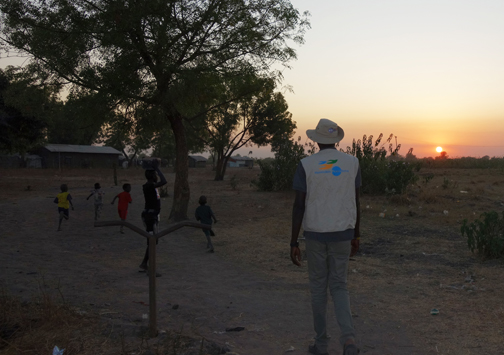Above Photo: From Nonviolentpeaceforce.org
On a night patrol in Bentiu town.
How did Nonviolent Peaceforce respond when South Sudanese women reported facing assault, harassment and robbery on their way to and from the market at night?
Our peacekeepers came up with a safety plan. They knew from experience that the day patrols Nonviolent Peaceforce conducted across South Sudan were successful in reducing violence in communities. So, they decided to start patrols at night. The goal was to prevent violence from occurring and to provide immediate response to violent incidents when they did happen. They also decided to make themselves available in case anyone needed accompaniment to or from the market.
This visible presence of our peacekeepers is a fundamental characteristic of unarmed civilian protection. Here’s why:
“Most aggressors prefer to carry out their abuse in private, without witnesses, to avoid legal, political, and social repercussions. The visible presence and engagement of external persons (such as internationals or nationals from other parts of the country) who would witness these abuses or human rights violations makes would-be perpetrators more reluctant to engage in violent acts. The presence of witnesses greatly increases the chances, or at least the perception, that the potential perpetrators will face negative consequences for their actions.” –Unarmed Civilian Protection: Strengthening Civilian Capacities to Protect Civilians Against Violence.
The team started their weekly night patrols in May of 2019. Two or three national and international staff members would leave the Nonviolent Peaceforce compound at 7 p.m. for the market or neighborhoods on their watch list. The team would talk to female merchants in the market who could direct Nonviolent Peaceforce to locations or situations of concern. Then the team would walk through the surrounding neighborhoods. The patrol would last for about two hours.
Here are a couple examples of how the night patrols have protected civilians:
While returning from a night patrol in July, our peacekeepers came across a group of four unaccompanied minors returning home after fetching water at a borehole. The youngest child was about two years old. Our peacekeepers helped the children carry water and safely accompanied them home.
In November, as the team was patrolling in town, they heard a woman scream. The team quickly found a group of women carrying a woman who was in distress to the hospital. It became clear that our peacekeepers needed to help. By foot, the group was going to take at least an hour to reach the hospital. Our staff called for one of our drivers instead. The team accompanied the woman and two relatives to the hospital, where she was admitted overnight for severe malaria.
Once our peacekeepers made sure that the family members and patient were safe and receiving appropriate treatment, they left to continue the patrol from the hospital.
While walking along the road, the team was stopped by an officer. Out of concern, he questioned the national team member on why he was walking through the area at night with foreigners. The next day, the team set up a meeting with the chief of police and with the governor’s security advisor to address what the officer the previous night had said. At the meetings, Nonviolent Peaceforce staff explained the purpose of the patrols at nights.
The security advisor thanked the team for their protection efforts. He said he would instruct all the security in the town to allow Nonviolent Peaceforce to continue unimpeded. The chief of police responded similarly, thanking Nonviolent Peaceforce for their work.
Members of the community have shown appreciation for the night patrols as well. During one patrol, our peacekeepers overheard people saying, “That’s Nonviolent. They move around at night to protect us.” Female merchants have also confirmed that the security situation has improved as more people have been seen outside late at night. A young female merchant selling milk remarked that she and other women now feel safer walking back home at 10 p.m.
Your support allows us to effectively protect civilians. Our peacekeepers’ relationships with the locals are stronger now. Because of the trust you allow us to build with civilians, they feel safe enough to make their needs known to Nonviolent Peaceforce. They know our peacekeepers will respond and protect them.
 Passing by a group of children playing while on a night patrol in Bentiu town.
Passing by a group of children playing while on a night patrol in Bentiu town.


